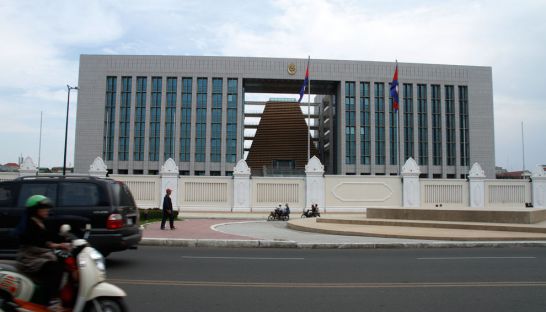Unofficial Translation from The Phnom Penh Post’s Khmer edition
TUESDAY, 18 NOVEMBER 2014,
TONG SOPRACH
ដល់ពេលត្រូវលាតត្រដាងខ្ទង់ចំណាយថវិកាជាតិជាក់ស្តែងហើយ !

Considering the adoption of the annual national budget expenditure, how many members of the parliaments clearly understand the technical terms regarding the basics of the income and the budget expenditure plan? Do they just imitate the other members when they raise their hands as the sign of consent/approval while they do not even understand the national budget proposals? Nor is there any representative from the Ministry of Economy and Finance to introduce the presentation to them all at the National Assembly members?
So far, some individuals working on the national and sub -national administrative levels have bitterly complaint about the difficulties. They have experienced in applying for their parts of the national budget already were approved by the Assembly. The other institutions that have enough or more than enough to spend would just ignore this disadvantage. Taking into account the law on financial management each year and the reason statement for proposals of financial management each year found that the budgets for spending of the civil, security, and public order institutions, and sub-national level have been increasing, as the national economic growth rate is around 7 percent.
This increase may sound like many of the ministries and other institutions, but in reality of expenditure, Where are these budget properly allocated? Why? Where can the documents, which contain the data about the allocation of budget, be found? Are the ministries and institutions only aware of that? For the public, there are no clear sources where they can find such data. Also, on the websites of the Ministry of Economy and Finance, and the National Assembly, it is not published. All we can find is the handbook of Royal Orders, signed by the king monthly.
So, where are the so-called “transparency” and “accountability”? Can the citizens have only assesses to the reforms and new policies, showed off by the government? When will the data of spending and budget of each institution be open to public? Even many members of the National Assembly do not know about that. From one year to another, they would just look for the data from different sources to analyze or compare to establish the appropriate plans of spending. Until now, the Assembly meetings are still held behind closed door, and a specific law is often adopted by the majority, most of who come from the ruling party (Cambodian People’s Party). Hence, it could be imply that some member will just raise their hand because they have to follow their colleagues, being afraid something bad will happen to them otherwise.
“Up to today, the exact data of spending in the previous year remains the “top secret”. In contrast, the data of government’s spending from 2000 to 2011 can be found on actual current budget expenditure databases from NGO Forum (www.cambodianbudget.org). For example, comparing the actual government expenditure in 2010 and 2011, we can notice that the spending of some ministries in 2011 is almost identical to that in 2010, while the spending of the other ministries almost 200{020613e3781e757fa5d0c4ea8d2e9a1eda2b430a524642dc0ce5b56489f01aa8} just in one year as Council of Ministers was spent around 287 billion Riels in 2010 and 505 billion Riels in 2011 while the expenditure of Ministry of Agriculture went down by 60 {020613e3781e757fa5d0c4ea8d2e9a1eda2b430a524642dc0ce5b56489f01aa8}, from 151 billion to 91 billion. Regarding this aspect, the transparency has to be proved and this question answered: why did the Council of Ministers accumulate their spending so rapidly while the Ministry of Agriculture underspent its budget so much just in one year?
Meanwhile, the individuals working in the sub-national level, especially the district-municipal level, have complaint about the underspending of their budget, which is only about 17 million dollars. Some districts or municipality have approximately 20 to 30 million Riels left in the budget. The common cause for that, according to my interviews with the officials from district/municipality level, is the long time and complicated process of applying part of the budget from the three provincial departments, which requiring going through a bunch of bureaus and departments, such as the Department of Public Functions, the Department of Economy and Finance, and the Provincial Treasury.
This process has 15 check points, and from one step to the next, the district officials will have to spend at least $5 of their own money. Totally, they will have to spend $90 per document. Considering the filling and submitting the application papers, many mistakes are usually found, so they have to go back and forth between the district and the provincial center so many times, which takes at least two weeks. Just like a Khmer proverb, “the fortune teller could lie, and the craftsman could steal!”, someone does not want to allocate the budget. That “someone” is making the process so complicated that the district officials do not no longer want the money.
This is just an example from a corner about the under-spending in the district administrative levels. The money left from the planned budget will be reserved for the next year’s use, and the process repeats again and again. Therefore, the Ministry of Economy and Finance has to reconsider their processing procedures trainings and performance of their provincial officials, as the ministry is a part of the Decentralization and Deconcentration (D&D) reform. Yet, to what extent can the ministry participate in the sub-national administrative development?
Furthermore, the senior officials of the Ministry of Economy and Finance seem to prejudge the exact spending, an act also known as the public estimation of national public expenditure. For example, they do not increase the pension for the retirees, as they think those people are no longer productive, and they consider some ministries, such as the Ministry of Women’s Affairs and the Ministry of Social Affairs and Veterans, useless. These are the roots of the problem, which has impact on the national budget expenditure. The question is “How can the Ministry of Economy and Finance bring transparency and accountability which support the four principles “To look at one’s image in a mirror, To take a shower, To rub off the dirt from the body and To treat someone” of appropriate work appearing in the speech about the drafting of the law on financial management and the reason statement for proposals of financial management in 2015.
In conclusion, the current national budget expenditure could not be reached with 100 {020613e3781e757fa5d0c4ea8d2e9a1eda2b430a524642dc0ce5b56489f01aa8} accuracy; it is sometimes a little higher or lower than the exact number, but it cannot be too much different. Moreover, the allocation of budget of unexpected functions which in the other countries, the president or the prime minister have the right to approve the budget. In accordance with the real needs of Cambodia, that aspect lies in table “B” of the law on the financial management in 2015, yet transparency is needed. Otherwise, the debates about and adopt on this law, which is the center of attention, will become a waste of space. That is due to the fact that the national assembly is the one who adopt it, but the body knows nothing about it. That is a shame for Cambodian legislature.
Tong Soprach is a social-affairs columnist for the Post’s Khmer edition.
Comments: [email protected]
